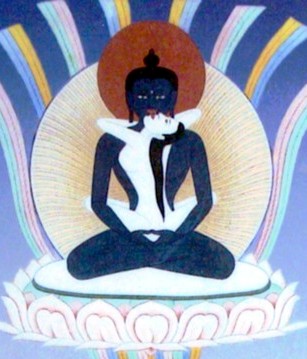Samantabhadra: Difference between revisions
Jump to navigation
Jump to search
mNo edit summary |
No edit summary |
||
| Line 5: | Line 5: | ||
2) One of the [[eight great bodhisattvas]], famous for the vastness of his offerings. | 2) One of the [[eight great bodhisattvas]], famous for the vastness of his offerings. | ||
==Further Reading== | |||
*Jamgön Mipham, ''A Garland of Jewels'', (trans. by Lama Yeshe Gyamtso), Woodstock: KTD Publications, 2008 | |||
[[Category: Buddhas and Deities]] | [[Category: Buddhas and Deities]] | ||
[[Category: Hundred Peaceful and Wrathful Deities]] | [[Category: Hundred Peaceful and Wrathful Deities]] | ||
[[Category: Dzogchen]] | [[Category: Dzogchen]] | ||
Revision as of 11:24, 29 January 2009

Samantabhadra (Skt.; Tib. Kuntuzangpo; Wyl. kun tu bzang po) —
1) In the Dzogchen teachings, our true nature, that state of the Ground, is given the name the 'Primordial Buddha'. He is depicted as a buddha, sky-blue in colour, sitting in the vast expanse of space, and encircled by an aura of rainbow light. He is completely naked, meaning unstained by any trace of concept. His name, Kuntuzangpo in Tibetan, Samantabhadra in Sanskrit, means ‘always good', ‘always well’ or ‘unchanging goodness.’ What this signifies is that unchanging goodness, or fundamental goodness, is our ultimate nature.
2) One of the eight great bodhisattvas, famous for the vastness of his offerings.
Further Reading
- Jamgön Mipham, A Garland of Jewels, (trans. by Lama Yeshe Gyamtso), Woodstock: KTD Publications, 2008